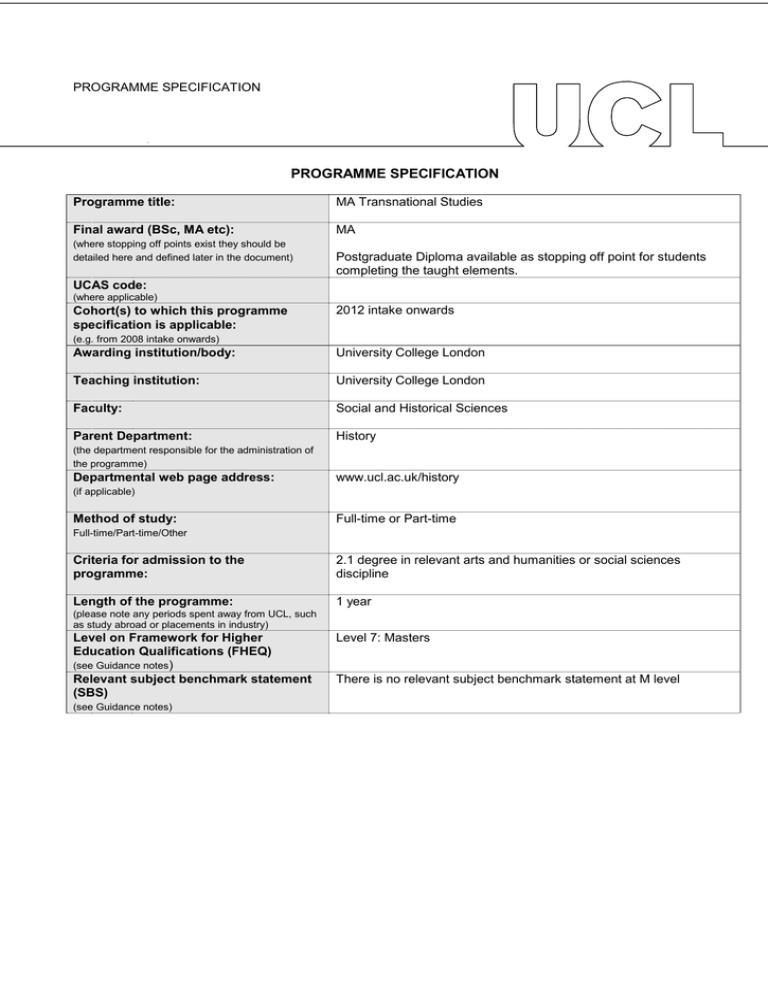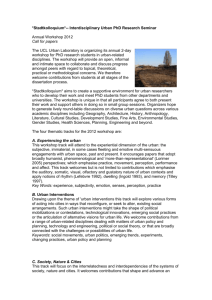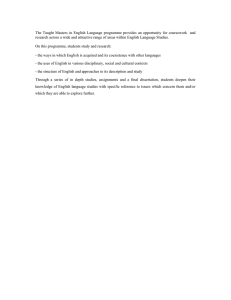PROGRAMME SPECIFICATION
advertisement

PROGRAMME SPECIFICATION PROGRAMME SPECIFICATION Programme title: MA Transnational Studies Final award (BSc, MA etc): MA (where stopping off points exist they should be detailed here and defined later in the document) Postgraduate Diploma available as stopping off point for students completing the taught elements. UCAS code: (where applicable) Cohort(s) to which this programme specification is applicable: 2012 intake onwards (e.g. from 2008 intake onwards) Awarding institution/body: University College London Teaching institution: University College London Faculty: Social and Historical Sciences Parent Department: History (the department responsible for the administration of the programme) Departmental web page address: www.ucl.ac.uk/history (if applicable) Method of study: Full-time or Part-time Full-time/Part-time/Other Criteria for admission to the programme: 2.1 degree in relevant arts and humanities or social sciences discipline Length of the programme: 1 year (please note any periods spent away from UCL, such as study abroad or placements in industry) Level on Framework for Higher Education Qualifications (FHEQ) (see Guidance notes) Relevant subject benchmark statement (SBS) (see Guidance notes) Level 7: Masters There is no relevant subject benchmark statement at M level Brief outline of the structure of the programme and its assessment methods: Structure: The programme comprises the following 4 elements: (see guidance notes) 1 A compulsory core course comprising a 15 credit research skills module and a 15 credit theoretical module: ‘Transnational Approaches’ (30 credits total) 2. A compulsory 15 credit language module (15 credits) 3 Optional modules of study chosen from a range offered by the Departments of History, Anthropology, Geography, Hebrew and Jewish Studies and the School of Slavonic and East European Studies, School of European Languages and Culture and the Centre for International Health and Development. (45 credits total) 4 A research dissertation of 15,000 words (90 credits). Assessment: 1 and 3 will be assessed mainly by coursework, with an examination in the theoretical module of the core course. 2 will be assessed by examination. Board of Examiners: i) Name of Board of Examiners: History Graduate Board of Examiners Professional body accreditation (if applicable): N/A Date of next scheduled accreditation visit: EDUCATIONAL AIMS OF THE PROGRAMME: This degree programme will take an interdisciplinary approach to the study of the transnational movement of ideas, people and goods as well as the causes and consequences of globalisation in historical as well as contemporary perspective. Students will familiarise themselves with the work of transnational agents and organisations. It aims to enable students to acquire relevant research skills and a critical awareness and understanding of current problems and/or new insights in the field of transnational studies, resulting in a substantial piece of transnational research. It will equip students either for further academic study of transnational developments or for careers with international organisations, the development sector and Non-Governmental Organisations. PROGRAMME OUTCOMES: The programme provides opportunities for students to develop and demonstrate knowledge and understanding, qualities, skills and other attributes in the following areas: A: Knowledge and understanding Knowledge and understanding of: 1.A body of knowledge relating to the process of globalisation, and the impact of transnationality on social, cultural and economic life. 2.The use of different disciplines in addressing transnational issues. Teaching/learning methods and strategies: Acquired through the compulsory core course ‘Transnational Approaches’ and option modules in various disciplines. Teaching will be by means of lectures and seminar discussions. Guest lecturers from NGS will contribute to the ‘Transnational Approaches’ core module. Assessment: Students will be assessed by a variety of methods including ‘unseen’ examinations, oral presentation, written course work and a research dissertation. B: Skills and other attributes Intellectual (thinking) skills: Teaching/learning methods and strategies: The programme aims to help students learn to These skills will be developed throughout the programme by means of the core courses and option modules and the final dissertation. 1. Evaluate evidence including that from conflicting sources 2. Evaluate current research and advanced scholarship in the disciplines studied 3. Deal with complex issues systematically and creatively 4. Evaluate new methodologies and develop critiques of them Assessment: Students will be assessed by a variety of methods including ‘unseen’ examinations, written course work and a research dissertation. C: Skills and other attributes Practical skills (able to): 1. Practise appropriate research techniques in one or more disciplines 2. Acquire a knowledge of a foreign language 3. Demonstrate self-direction and originality in tackling and solving problems Transferable skills (able to): 1. Plan and execute an independent research project; 2. Present the results of their research in written and oral form; 3. Take responsibility for their own independent learning; Teaching/learning methods and strategies: 1. Research skills will be taught by means of the compulsory core module. 2.Students will be required to take a 15 credit module in a relevant foreign language. Depending on the student’s interests and level of existing language competence, this may take the form of improving fluency in an existing language, or commencing a new language ab initio. 3. Will be acquired through participation in seminars and in coursework and the dissertation. Assessment: 1 and 3: Assessed through coursework essays and the dissertation 2: Assessed by written/oral examination D: Skills and other attributes Teaching/learning methods and strategies: 1 and 3: The dissertation will be supported by individual expert supervision as well as group workshops on research methods. 2 and 4: Students will be expected to give presentations and contribute to discussion in seminars for the option courses. They will also present their research topic at a student conference in the summer term. 4. Participate constructively in debates and discussions. Assessment: 1 and 3 will be mainly assessed by means of the dissertation. 2 will be assessed through coursework essays, the dissertation and a presentation on the research topic. The following reference points were used in designing the programme: the Framework for Higher Education Qualifications (http://www.qaa.ac.uk/Publications/InformationAndGuidance/Pages/quality-code-A1.aspx); the relevant Subject Benchmark Statements (http://www.qaa.ac.uk/Publications/InformationAndGuidance/Pages/quality-code-A2.aspx); the programme specifications for UCL degree programmes in relevant subjects (where applicable); UCL teaching and learning policies; staff research. Please note: This specification provides a concise summary of the main features of the programme and the learning outcomes that a typical student might reasonably be expected to achieve and demonstrate if he/she takes full advantage of the learning opportunities that are provided. More detailed information on the learning outcomes, content and teaching, learning and assessment methods of each course unit/module can be found in the departmental course handbook. The accuracy of the information contained in this document is reviewed annually by UCL and may be checked by the Quality Assurance Agency. Programme Organiser(s) Dr Axel Körner Name(s): Date of Production: March 2011 Date of Review: July 2014 Date approved by Head of Department: Date approved by Chair of Departmental Teaching Committee: Date approved by Faculty Teaching Committee


